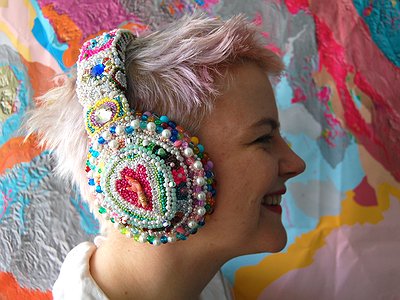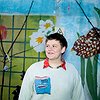Part 1
Name: Faith Elliot
Nationality: British and American
Occupation: Artist
Current Release: Impossible Bodies on OK PAL Records
Recommendations: I'm gonna go with 'The Aquatic Uncle' - which is a short story
about evolution from the perspective of a tetrapod - from Italo
Calvino's 'Cosmicomics' / 'Eels Eat Pizza'
Website/Contact: To read about Faith's music and see the artwork, visit faitheliott.com
When did you start writing/producing music - and what or who were your early passions and influences? What is it about music and/or sound that drew you to it?
I did a lot of singing in choirs when I was a kid. I've always loved to sing. But it wasn't until I was a teenager that I would say music became something I was passionate about. Mostly I was into melancholy
glam rock like Placebo, the Manic Street Preachers, Hole... I wrote a lot of poetry... Lyrics and subject matter always took precedence over the technical aspects and quality of sound. I think I had to learn an
appreciation of those things later.
For most artists, originality is first preceded by a phase of learning and, often, emulating others. How would you describe your own development as an artist and the transition towards your own voice? What
is the relationship between copying, learning and your own creativity?
Actually I feel like I was slowed down in the earlier stages of writing because I was afraid to copy. Originality is a weird, over-rated concept. If you strive to be original above anything else, the finished
product can be contrived and inaccessible. Art is good because it's a conversation that we're all having, so if we don't reflect each other then where will the relate-ability come from? These days I try to let
myself copy more freely, and it usually evolves into something distinct anyway.
What were your main compositional- and production-challenges in the beginning and how have they changed over time?
I started playing guitar late, in my mid-twenties. I tried a few gigs singing songs I had written a cappella but it felt too intense so I pushed myself to learn guitar. It took a while to get comfortable with
it but I love playing now. My knowledge of recording and production was nil to start and is still pretty basic. I know enough to communicate with other people about it. I used to be very determined to do everything myself, but I always hit a wall with recording and production. These days I'm better at having confidence with the limits of my abilities. Luckily, I have a lot of amazing friends with very varied skill sets and we support each other.
What was your first studio like? How and for what reasons has your set-up evolved over the years and what are currently some of the most important pieces of gear for you?
As far as recording goes, I use a little ZOOM dictaphone to keep track of what I'm doing. I find it useful to keep things as simple and easy as possible so I can just get my ideas down. Once the song structure is there, it evolves into something with more shape from building up layers of guitar stuff and vocal harmonies on my looper, playing live and collaborating with other people.
How do you make use of technology? In terms of the feedback mechanism between technology and creativity, what do humans excel at, what do machines excel at?
I think machines are probably quite good at doing unexpected things that are potentially infuriating but also potentially interesting if you keep an open mind.
Production tools, from instruments to complex software environments, contribute to the compositional process. How does this manifest itself in your work? Can you describe the co-authorship between yourself and your tools?
I really don't think it's something I have much awareness of... I get the bones of a song down on my own with my guitar and then it just evolves the more I play it!
Collaborations can take on many forms. What role do they play in your approach and what are your preferred ways of engaging with other creatives through, for example, file sharing, jamming or just talking
about ideas?
Well, I always write lyrics and melody on my own. Then when I am rehearsing with other people I really like to see what they come up with... I think if you offer too much direction you might stifle what
they might do on their own, which could be something cool that you wouldn't have thought of yourself. I usually feel really excited to hear my songs evolve when another person steps in.
Could you take us through a day in your life, from a possible morning routine through to your work? Do you have a fixed schedule? How do music and other aspects of your life feed back into each other - do you
separate them or instead try to make them blend seamlessly?
It really depends on what kind of phase my life is in! At the moment I'm doing a lot of prep for my album release and mostly a hermit unless I am gigging. If I am writing music, it's usually first thing in the morning or late at night... One of my money-makers right now is pet portraits. So I spend a good chunk of my days listening to audiobooks, eating hummus and drawing other people’s dogs.
Could you describe your creative process on the basis of a piece or album that's particularly dear to you, please? Where did the ideas come from, how were they transformed in your mind, what did you start with and how do you refine these beginnings into the finished work of art?
'Impossible Bodies', is a bestiary, so each song is symbolised by a different animal. Concept albums seem to have a bad rep but for me it was a super helpful way of approaching song writing. When I have a narrative behind my idea, it's like a scaffolding I can build my ideas around. I tend to do a lot of research too. The song 'Laika', for instance, is about the Soviet space dog that was sent into orbit in the 50s. When I was writing that one I read a bunch about the life cycles of stars, the stories behind
constellations, etc.
There are many descriptions of the ideal state of mind for being creative. What is it like for you? What supports this ideal state of mind and what are distractions? Are there strategies to enter into this state more easily?
People often really romanticise the artistic process. Very occasionally you experience that fabled moment where an idea hits you and you pick up your pen and it flows out as a perfect whole. But more often writing a song can be a real slog and takes bloody ages, which is just as valid and satisfying in the long run, but maybe less adaptable to a Hollywood bio-pic. I think it's just about putting the hours in and hoping for the best, and being open to things not working how you want them to.
How is playing live and writing music in the studio connected? What do you achieve and draw from each experience personally? How do you see the relationship between improvisation and composition in this regard?
Super important. Playing a new song out can completely change how I feel about it, and often helps me realise what direction I want to go with it.
How do you see the relationship between the 'sound' aspects of music and the 'composition' aspects? How do you work with sound and timbre to meet certain production ideas and in which way can certain sounds already take on compositional qualities?
For my songs, it seems to be about striking a balance so that the meaning of the song and the sound is just literal enough. i.e. if the song is about space dogs, put just enough spacey synth noises in there, but not so much that its cheesy. It's a fine balance. There's this classical suite called the Carnival of the Animals, which I was really inspired by when recording this album and shared with the producer I worked with. Each movement in the suite represents a family within the animal kingdom. It does a beautiful job of sounding anthropomorphic. A lot of the watery, arpeggiating pianos and guitar picking on my record came out of listening to 'The Aquarium'.
Our sense of hearing shares intriguing connections to other senses. From your experience, what are some of the most inspiring overlaps between different senses - and what do they tell us about the way our senses work? What happens to sound at its outermost borders?
I have been making visual art much longer than music and I tend to use a lot of visual metaphors when I think about how I want things to sound. It comes out especially when talking to collaborators. I end up
describing things in terms of texture, colour, and composition.
Art can be a purpose in its own right, but it can also directly feed back into everyday life, take on a social and political role and lead to more engagement. Can you describe your approach to art and being an
artist?
It sounds corny, but I'm always thinking about art. I seem to have somehow made it my job to endlessly indulge myself! I would really like to teach though. And one of my dreams is to open a print shop.
It is remarkable, in a way, that we have arrived in the 21st century with the basic concept of music still intact. Do you have a vision of music, an idea of what music could be beyond its current form?
At the moment, I'm really interested in the idea of songs as a way of writing fiction. Bring back the concept album!





